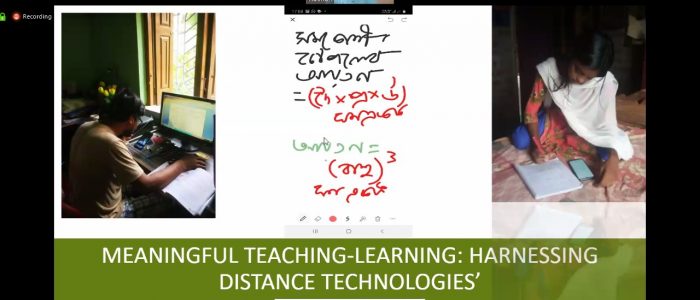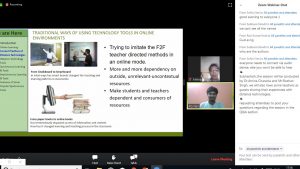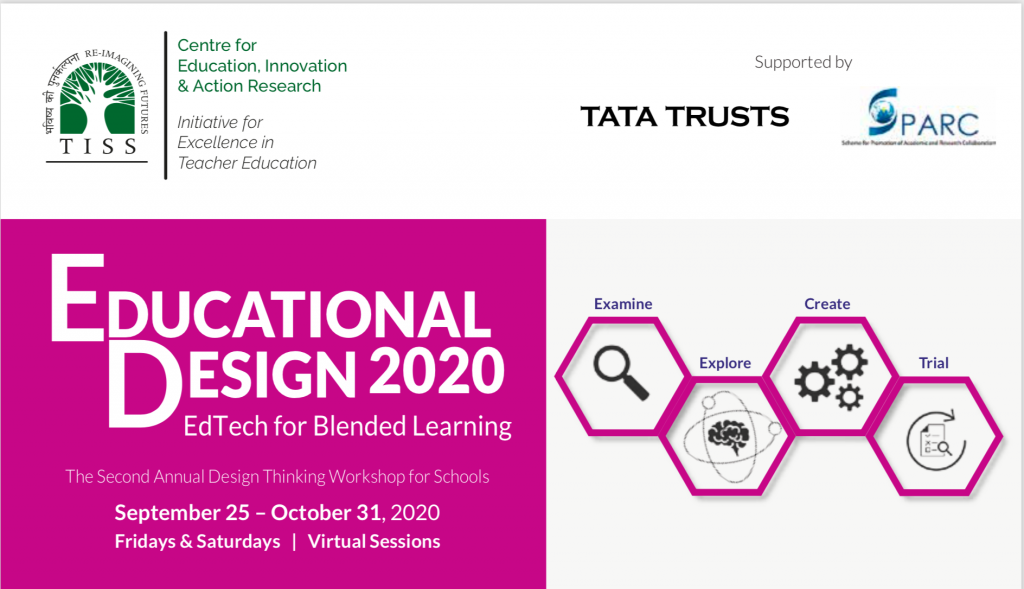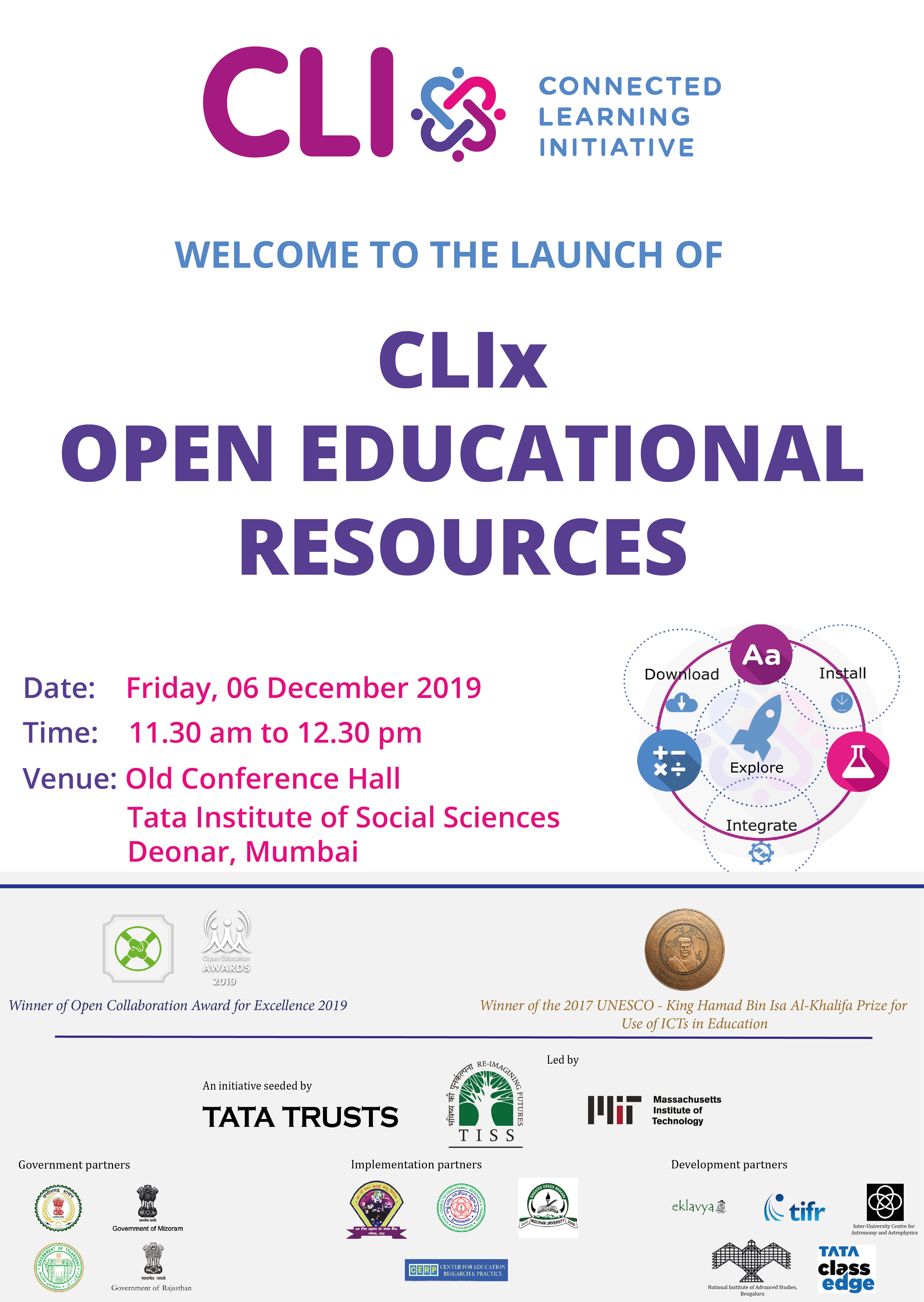COOL-ITE WEBINARS- Reflecting on our experiences
The Integrated approach to Technology in Education (ITE) is an initiative of the Tata Trusts incubated in the Centre for Education Innovation and Action Research, TISS that runs in eight, mostly semi-urban and rural locations in Eastern and Northern India and has reached over to around 1,48,258 children/adolescents and 3400 (including master trainers and outreach teachers) teachers. Initiated in 2012, the central concept of ITE is to enable teachers to design activities for the students. So that they create ICT artifacts to deepen their knowledge in the subjects at school. Thus, it believes in the concept of Learners as Producers rather than passive consumers of the ICT resources. Adopting a largely constructivist pedagogical framework, the initiative seeks to improve teaching and learning processes and foster authentic and project-based learning in adolescents in some of the most underprivileged geographies in India.
‘Webinar on Harnessing distance technologies for collaborative learning in school education’
In the COVID period, the ITE team took some of their learning from our work in the field and curated a workshop experience for teachers in the webinar format, titled ‘Harnessing distance technologies for collaborative learning in school education’ in May 2020. The main objectives of this two-part webinar series was to help teachers understand and imagine the possibilities of active and collaborative pedagogy using technology. Given the challenges posed by COVID-19, we felt teachers would be eager to use technology creatively for distance and remote learning. The first webinar was organized on the 2nd of May, 2020 to explore synchronous & asynchronous tools and pedagogies for collaborative & active teaching-learning in distance mode. A total of 264 participants attended the webinar. The second webinar was organized a week after the first one, on 9th May 2020, related to authentic learning using ICT. Authentic learning engages learners in problem-solving activities connected to their lives and cultural context. In this webinar teaching-learning experiences of ITE teachers were highlighted to demonstrate how students’ use of ICT can leverage the integration of authentic learning in the classroom. A total of 161 participants attended the webinar.
We usually run teacher professional developments in the face to face mode and it was encouraging to receive positive feedback from our webinar participants. Participants appreciated the way the webinar was organized and conducted. They appreciated the flow of the webinar as well as the coordination amongst the facilitators. Moreover, they also appreciated the way in which the experiences were shared by the facilitators as well as the ITE teachers. The topic of the webinar resonated with participants and they found it relevant to the current crisis situation. The way we demonstrated the use of technology in education, like whiteboards on zoom, google classroom, etc explained was found to be helpful. The student projects shared as examples of authentic learning were also deemed helpful in understanding the concept of authentic learning with technology.
Participants appreciated the various resources and tools that were shared and demonstrated during the webinar, that would aid in smoothly conducting the online sessions They also reported that the material shared via email after the webinar was informative and helpful in implementation of the concept and the ICT based activities discussed and the connection drawn between ICT activities and real-life situations was very helpful. The student projects shared helped in understanding the concept better.
As webinar designers, we learnt that using polls during the session for meaningful activities made the session more interactive and helped in keeping engagement levels high. The panelists were able to address the questions and issues through the chatbox properly. A lot of meaningful questions were being asked by the participants, both in the chatbox as well as the Q/A session which helped in making the session more fruitful. The ITE rubric used for participants to assess student projects increased the participation level.
The ITE team has now released Assam Goes Online (AGO) a COVID-19 pandemic special blog for teachers, parents and students. It is an initiative that will help the teachers and parents to cover the syllabus of March and April 2020 through online mediums, during this lockdown period. Teachers can share the link with the students via WhatsApp or text message the activities and resource links to the students. AGO is initiated by the Tata Institute of Social Sciences in collaboration with Gramya Vikash Mancha (GVM) and Samagra Shiksha, Assam. The teachers who completed the ‘Certificate in ICT in Education course’ offered by TISS and teachers who have been implementing ITE have come forward and volunteered to design these modules for subject-specific activity centered topics that can be conducted through WhatsApp, messages, etc in an asynchronous manner. To directly access the lesson plans, please click on the link: https://agoblog.leap21stcentury.org/
‘Webquest on Air Quality Index’
After witnessing overwhelming participation at the past 2 All India ITE WebQuests Communicable Disease (around 230 participants) and Air Quality Index (around 300 participants), conducted in March 2020 and May 2020 respectively, we have learned that ITE WebQuests have helped students to dig deeper into a topic and do a lot of meaningful research. These WebQuests engaged students and teachers in making online quizzes, projects, research in virtual groups, and taking synchronous quizzes with students across the nation. Since there is a limitation to the number of students that can participate in the LIVE ITE WebQuest, we are now announcing ITE WebQuests at state and district levels. We will support all ITE Master Trainers and Outreach Teachers to conduct their own ITE WebQuests and provide the support required by distributing ITE WebQuest Manual, provide orientation sessions regarding WebQuests along with any Technical Support and Platform to host. The following are the links from where updates regarding the resource material for the ITE WebQuest can be accessed.
- WebQuest 1- Communicable diseases- https://sites.google.com/view/iteWebQuest1-com-disease/
- WebQuest 2-Air Quality evaluation- https://sites.google.com/view/air-quality-evaluation
It was great to see how ITE practicing teachers and students in the pre COVID period smoothly adapted to an activity centered teaching and learning in the distance period. Truly demonstrating their digital agency: leveraging their ITE competence, confidence and autonomy to adapt in an unknown context.
ITE Team,
CEIAR, TISS






